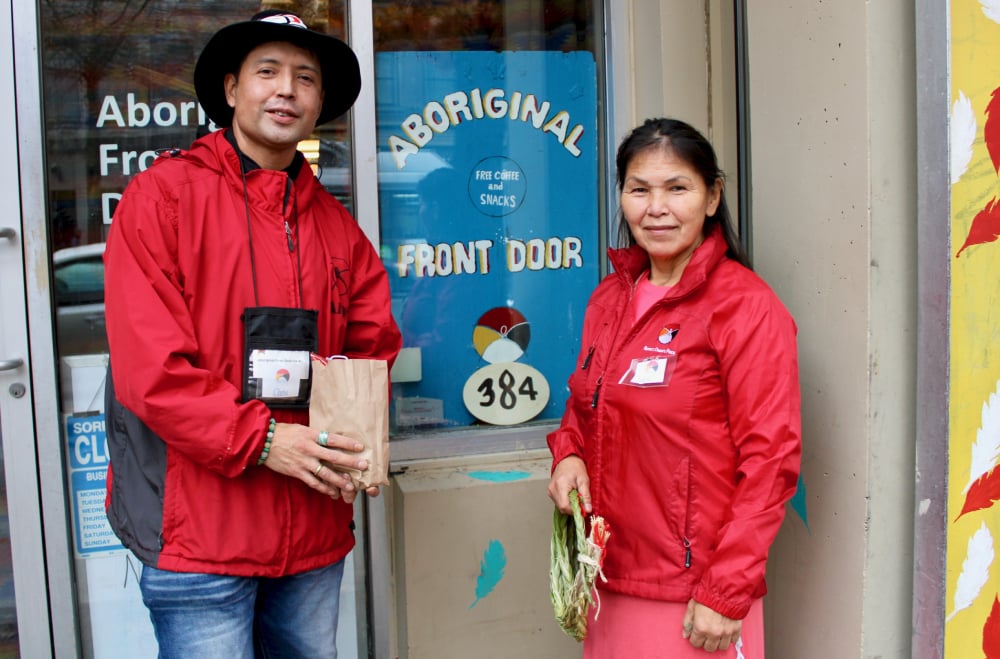An Indigenous organization in the Downtown Eastside has started an outreach effort to connect homeless people to housing and other resources and fill the gaps that have been made worse by the pandemic.
Some organizers of Aboriginal Front Door Society’s Sweet Grass Patrol have compared it to Bear Clan Patrol, an Indigenous-led community safety organization that started in Winnipeg.
But Sadie Coté and Chris Vaneltsi say Sweet Grass Patrol currently has a more focused mission: to connect with unhoused people and try to ease the frustrations that come with being shut out in the cold.
“We’re letting them know what resources are out there,” said Vanelsti, who is Tetlit Gwich’in and Mohawk. “With COVID, a lot of places got shut down, so we’re not giving them the runaround. We’re giving them accurate information that helps them.”
Armed with care packages that include masks, hand sanitizer, snacks and bottled water, Coté and Vanelsti have been hitting the streets since Nov. 6 to try to fill what they say is an unmet need. They are also looking for more volunteers to help. (Contact Aboriginal Front Door Society for more information.)
The city opens extra shelter spots every fall to help people get out of the rain and cold. But the number of people allowed to stay in shelters has been reduced in an effort to limit the spread of COVID-19. Pandemic precautions have also made it more difficult to find enough buildings to use as winter shelters. There are 379 fewer shelter spots open this winter compared with 2019, according to numbers provided by the City of Vancouver.
“The last thing we want to do is send people to a place that’s not open,” Vaneltsi said.
“They get frustrated and the frustration builds — we’re just trying to contain that frustration.”
Coté, a member of the Wet’suwet’en First Nation, said there aren’t enough shelter spots for everyone who is sleeping on the streets or precariously housed. While most people say they’d like permanent housing, many don’t want to go to a shelter because of a bad experience or because they’re worried about getting COVID-19.
Sweet Grass Patrol is also collecting information from the people they encounter, including age, gender and whether they spent the night in their car, at a friend’s place, in a shelter or on the street.
While the city does an annual count of people who are homeless, Coté said Sweet Grass Patrol is trying to create a more accurate picture of homelessness in the Downtown Eastside, Strathcona and around Granville Street.
The group is also trying to get people to sign up as members of Aboriginal Front Door so they can be connected with services that can help them recover lost identification (a barrier many homeless people face in applying for social assistance), set up a bank account, connect with housing or get help with drug and alcohol dependence.
Sweet Grass Patrol can also help with immediate needs for people sleeping rough, distributing things like free sleeping bags, tarps, blankets and backpacks.
In 2019, nearly 40 per cent of homeless people surveyed in Vancouver identified as Indigenous, despite Indigenous people making up just 2.2 per cent of the city’s population.
Coté said when people living on the street are approached by people who look like them and have had similar experiences, it helps build trust.
“One of our Aboriginal Front Door visions is Aboriginal people helping other Aboriginal people, and their friends and neighbours,” Coté said.
“Myself, I was part of the ‘60s Scoop so I had to go through all the research, go through all the searching because I had no resources at all since aging out of care.
“I don’t want these young people to go through that reinventing the wheel.” ![]()
Read more: Aboriginal Affairs
















Tyee Commenting Guidelines
Comments that violate guidelines risk being deleted, and violations may result in a temporary or permanent user ban. Maintain the spirit of good conversation to stay in the discussion.
*Please note The Tyee is not a forum for spreading misinformation about COVID-19, denying its existence or minimizing its risk to public health.
Do:
Do not: